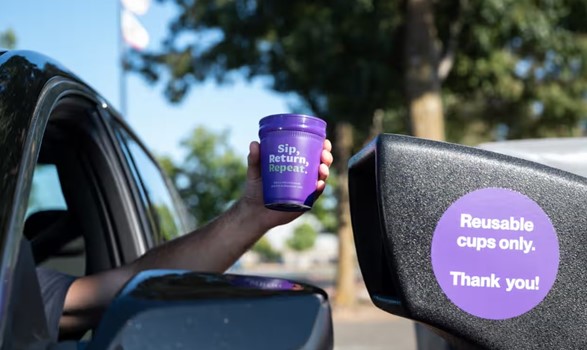
Innovative Reusable Cup Program Takes Aim at Single-Use Waste in Petaluma
In Petaluma, California, an array of purple reusable cups is quickly becoming a common sight at Avid Coffee. On a recent weekday, barista Sam Gearhard stood behind the counter, serving customers not in the usual disposable cups but in these eye-catching, reusable ones marked with the slogan "Sip, Return, Repeat." This initiative is part of a pioneering effort to reduce the staggering amount of plastic waste generated by single-use cups.
Petaluma, a picturesque city in California's wine country about 50 miles (80 km) north of San Francisco, has become the first in the U.S. to launch a city-wide reusable cup system. The program, which includes 30 local businesses from small cafes to major chains like Starbucks, allows customers to take their beverages to go in reusable cups that they can return to any of 60 drop-off bins scattered throughout the city. Each cup is equipped with a QR code, enabling organizers to track usage and returns.
Gearhard, who works at Avid Coffee, notes that the transition to reusable cups has been smoother than expected. "We've fully switched to reusables since the program began, and the response has been positive," he says. Even though some travelers still ask for paper cups, the majority of customers have embraced the change.
Petaluma's new program is part of a broader movement in California to reduce reliance on single-use plastics. The state, which passed a law in 2022 mandating that all packaging be recyclable or compostable by 2032, is leading the charge in the fight against plastic waste. In recent years, cities like Los Angeles and Berkeley have implemented strict regulations on single-use plastics, and Petaluma is the latest to join the effort with its reusable cup initiative.
Leslie Lukacs, executive director of Zero Waste Sonoma, one of the organizations behind the project, emphasizes the local commitment to combating climate change. "Our community has faced its own climate challenges, including wildfires and flooding. There's a strong political and public will here to address these issues," Lukacs says.
The program officially launched on August 1st, and early feedback has been encouraging. Customers and businesses alike are adjusting well, and many, like Alisha Bright, owner of Fiber Circle Studio, are already seeing the benefits. Bright mentions that the reusable cups keep drinks cold longer and are more durable than traditional single-use cups.
This initiative is backed by a coalition of corporations, investment firms, and startups, including Closed Loop Partners, Starbucks, and PepsiCo. They've partnered with the city of Petaluma, Zero Waste Sonoma, and Recology, a local recycling program, to evaluate the program's viability and potential for expansion to other cities. Key metrics being monitored include the rate of cup returns and the environmental impact of washing and transporting the cups.
Jessica Heiges, a project director in zero waste and circularity at WSP, notes that while reusable cups have a higher environmental cost to produce, their effectiveness depends on the number of times they're reused. The success of the Petaluma program, she suggests, will hinge on making the reusable option as convenient as disposables.
Every cup in the program is equipped with a QR code, allowing for precise tracking of how often and where they are returned. Kate Daly, managing director at Closed Loop Partners, mentions that the data collected will also help determine the program's environmental footprint, including the resources used to clean and transport the cups.
While plastic was chosen as the material for these reusable cups due to its light weight and durability, the project still faces challenges. Alastair Iles, a professor at UC Berkeley, points out that managing logistics like cup collection and consumer behavior will be crucial to the program's success.
The pilot phase of Petaluma's reusable cup initiative will run through November, and its future will depend on the outcomes of this trial period. Ashley Harris, owner of Petaluma Coffee and Tea, remains optimistic. "We see a lot of waste in the coffee business, and it's heartbreaking. If there's a way to improve, we're all in," she says.